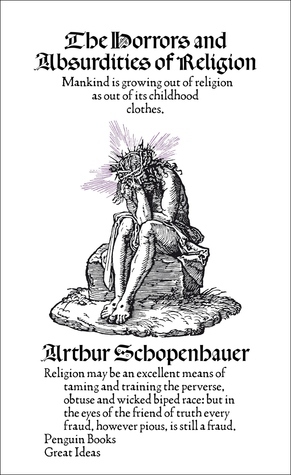
The Horrors and Absurdities of Religion
Book Description
Dive into a world where belief teeters on the edge of chaos. Arthur Schopenhauer unravels the tangled web of religion, exposing its absurdities and the horrors that linger in the shadows of faith. With razor-sharp insights, he critiques dogma, dismantles sacred myths, and confronts the emotional turmoil bred by blind devotion. Each page crackles with tension as he challenges the foundations of spirituality, igniting a firestorm of thought that refuses to be ignored. What truths lie hidden beneath centuries of tradition, waiting to be unleashed? Embrace the turmoil and question everything—are we enslaved by the very beliefs we hold dear?
Quick Book Summary
In "The Horrors and Absurdities of Religion," Arthur Schopenhauer offers a searing philosophical indictment of religious belief. He examines the irrationalities that underpin faith traditions, highlighting how dogma distorts reason and enforces conformity. Schopenhauer exposes the cruelty and suffering perpetuated in the name of religion, arguing that it often amplifies humanity’s darkest impulses rather than fostering virtue. He scrutinizes religious myths and rituals, demonstrating their role in manipulating fear and curbing intellectual autonomy. Ultimately, Schopenhauer invites readers to question the inherited truths and psychological mechanisms that keep religious systems in place. Unapologetically skeptical, the work serves as a call to embrace individual reason over collective superstition, urging a confrontation with belief’s most uncomfortable realities.
Summary of Key Ideas
Table of Contents
Religion as a Product of Human Fear and Ignorance
Schopenhauer begins by tracing the roots of religion to fundamental human fears—particularly the fear of the unknown, death, and suffering. He contends that religious belief arises less from revelation or intrinsic truth and more from our psychological need for reassurance in the face of life’s uncertainties. This dependency, he suggests, makes societies susceptible to clinging to fantastical stories or speculative metaphysics as a guard against existential dread, preferring comforting illusions to painful realities.
Dogma Versus Reason and Individual Autonomy
Next, Schopenhauer turns his scrutiny toward religious dogma and its intrinsic opposition to reason. He argues that rigid doctrines demand uncritical acceptance and discourage genuine inquiry. Institutions developed around religious ideas often enforce conformity through social or even violent means. In suppressing intellectual independence, religion becomes an obstacle to the cultivation of clear thought and self-determined values, perpetuating mental servility among believers.
The Ethical Consequences of Religious Belief
A key dimension of Schopenhauer’s critique is the moral or ethical legacy of religion. Far from promoting compassion or moral clarity, religious systems often sanction cruelty, intolerance, and even atrocities in the name of obedience to divine will. He considers historical examples of violence and persecution, suggesting that faith, when yoked to power, justifies actions that would otherwise be condemned. Thus, he warns against conflating religious piety with genuine ethical progress.
The Manipulation of Emotion Through Ritual and Myth
Schopenhauer also examines how religious practice manipulates emotion through ritual and myth. Ceremonial pageantry, sacred narratives, and symbolic gestures serve to deepen emotional investment, anchoring collective identity while discouraging skepticism. These powerful mechanisms bypass rational faculties, embedding faith on a subconscious level and reinforcing its hold across generations. Religious experiences, he argues, are manufactured to elicit awe and fear, thus cementing obedience.
The Call for Critical Examination of Faith
In closing, Schopenhauer issues a passionate appeal for critical self-examination of inherited beliefs. He urges readers to resist passive acquiescence and to scrutinize the traditions passed down through families and cultures. True enlightenment and freedom, he suggests, come from embracing reason and cultivating independent judgment rather than deferring to the teachings of authority. The work stands as a clarion call for personal autonomy and philosophical clarity in the face of centuries-old dogmatism.
Download This Summary
Get a free PDF of this summary instantly — no email required.





